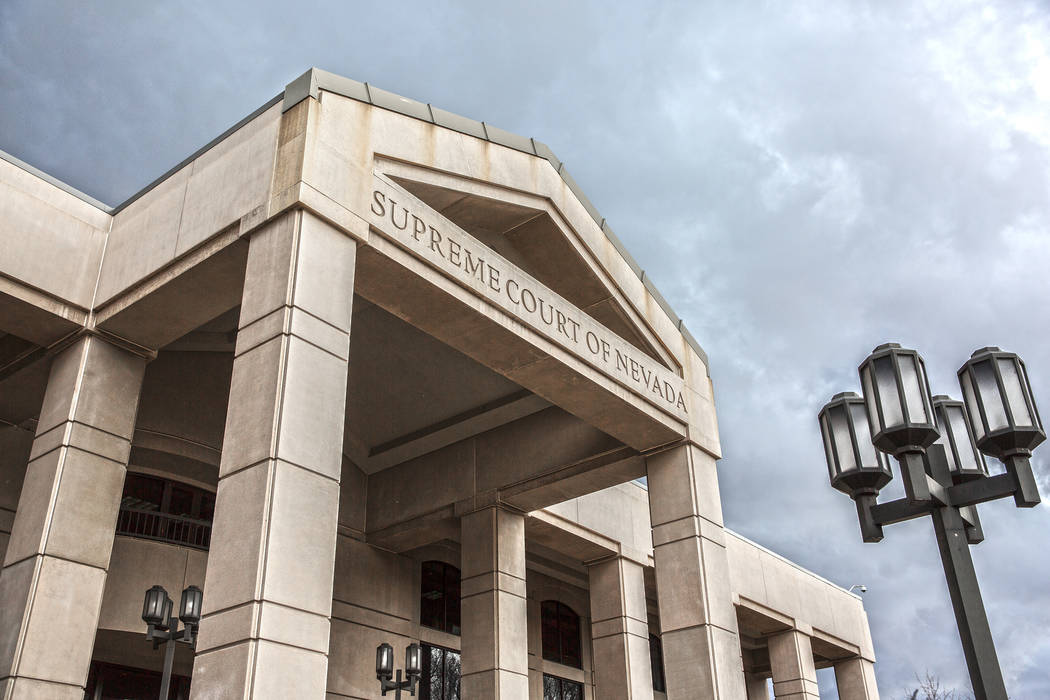Lawyers spar in Nevada high court over representation in tax case
Attorneys debated Tuesday before the Nevada Supreme Court whether lawyers for the Legislature can defend Democratic lawmakers in a lawsuit filed by their Republican colleagues, a preliminary skirmish in what will likely be a precedent-setting case.
Amid extensive questioning from all seven justices, the court Tuesday allowed arguments to run nearly double the originally allotted 30 minutes, with Chief Justice Kristina Pickering promising at the conclusion that the court would rule “as expeditiously as possible.”
The underlying case is a lawsuit filed by all eight Senate Republicans in July challenging the legality of two tax bills passed with Democratic majority support last session. Republicans contend the bills required two-thirds majority support in both houses to pass; they fell one vote short of that margin in the Senate.
While arguing the tax case in Carson City District Court, however, lawyers for the Republican senators objected to attorneys for the Legislative Counsel Bureau representing defendants such as Senate Majority Leader Nicole Cannizzaro, D-Las Vegas; Senate Secretary Claire Clift and Lt. Gov. Kate Marshall, who presides over the state Senate. District Court Judge James Todd Russell sided with the Republicans, and ruled the defendants needed to hire their own outside lawyers so the Legislative Counsel Bureau could maintain its bipartisan neutrality.
On Tuesday, Justice James Hardesty was critical of Russell’s suggestion that legislative lawyers “picked sides” in the dispute, and lawyers for both sides affirmed that there was nothing in the court record to suggest such a scenario.
“As far as taking direction, on behalf of the organization, it’s the majority rule concept,” said Kevin Powers, chief litigation counsel for the bureau. “So if the Legislature as the majority decides to direct us to do something, we would have to do that.”
Powers also argued the GOP plaintiffs gratuitously named Cannizzaro and the other legislative defendants in the lawsuit in a strategic move to get legislative lawyers removed from the case.
“The plaintiffs chose to put them in this case,” Powers said. “They made a tactical and calculated litigation decision.”
Later, under questioning by Hardesty, GOP lawyer Karen Peterson at first demurred on why those defendants were included. She later said the plaintiff’s lawsuit “didn’t need the Legislature at all” but quickly pivoted.
“We did need those parties, we absolutely needed those parties, because they were the ones that violated the Constitution when they approved” the tax bills, she said.
On the question of conflict, Peterson said that despite statutory exceptions for government lawyers in some instances, the Legislature, as the client in the case, “doesn’t get tell the lawyer whether the lawyer has a conflict or not, or whether the lawyer owes an ethical obligation to another client.”
But Powers replied that the Republican senators — who sued the Legislature — were not acting as lawmakers entitled to representation from the institution’s lawyers. “A member who sues their own organization is not acting as a duly authorized constituent” of the Legislature, he said.
Contact Bill Dentzer at bdentzer@reviewjournal.com or 775-461-0661. Follow @DentzerNews on Twitter.


















